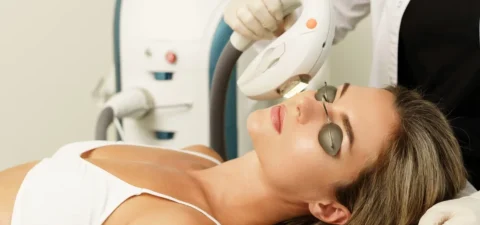For information only. Not meant as advice in any form. Please consult your medical professional or lawyer.
Working in the cosmetics and beauty industry is an exciting career option now that many people are seeking advice for achieving healthier skin. If you enjoy helping people improve their lives and become more confident in their appearance, then an esthetician career might be a good fit for you.
But what exactly do estheticians do? An esthetician is a skincare specialist that provides skin and beautification treatments, like body treatments, waxing, chemical peels, facials, and more. But note that they’re not medical professionals, so the types of treatments they offer are limited to cosmetology-related ones.
Esthetician’s Duties and Job Description
Different signs of aging can be hard to manage with skincare products alone, so many people turn to a licensed esthetician for skincare treatments that keep their skin healthy and younger-looking. According to Associated Skin Care Professionals (ASCP), about 183,000 estheticians are registered and licensed in the country to help patients with their skin and beauty needs.
The demand for licensed estheticians is growing quickly, so many people consider going to a beauty school and applying for an esthetician license. But before you start looking for an esthetician school accredited by your state or the National Accrediting Commission of Career Arts and Science, here are some of the most important things you need to know first about being a licensed esthetician.
1) What They Do
An esthetician is a skincare specialist trained in skin analysis, cosmetic skin treatments, and beautification. They usually work in salons and spas to offer procedures like waxing, facial treatments, extractions, exfoliation, scrubs, body wraps, makeup application, and more.
Estheticians also come in many different types depending on what they specialize in and what their level of experience is. As an aspiring esthetician, here are some of your options in the esthetics industry:
- A medical esthetician is the type of esthetician that works in a medical setting like medical spas. They specialize in medical esthetics, so they work alongside a dermatologist, nurse esthetician, or other medical professionals.
- A spa esthetician focuses on services that relax a client and enhance their facial appearance. Some of their most popular treatments or services include aromatherapy, massage therapy, and facials.
- A facial esthetician focuses on the different types of facial treatments to cater better to their patients. They know everything about facials, from cleansing techniques to physical exfoliation and more.
- A skincare specialist is a kind of skincare professional that focuses on the scientific side of esthetics and cosmetology. They usually work with patients who suffer from chronic skin concerns like acne, rosacea, and signs of aging.
- A master esthetician has a job similar to that of a regular esthetician, but they’re also qualified to perform a wide range of other skin treatment options thanks to the extra training hours they received.
2) What They Can’t Do
Estheticians have a limited skill set so they typically only perform treatments on the superficial layer of the skin. They’re not trained to carry out a medical treatment like Botox or dermal filler. They also can’t perform deep chemical peels since this kind of facial treatment penetrates deep into the patient’s skin.
Another thing that estheticians can’t directly do is own or operate a medical spa by themselves. Unless you’re qualified for the right license, most states in the country don’t allow estheticians to own aesthetic medical practice. They need to team up with an MSO, physician, or physician-owned company before they can cooperate in a medical spa.
3) Expected Esthetician Salary
Licensed estheticians in the country have an average salary of $38,324. Factors like location and experience affect an esthetician’s salary, so it’s not surprising that estheticians in New York have the highest average salary at $45,484 per year or $21.87 per hour. These areas are where most rich and high-profile clients go to get skin treatments.
Estheticians who operate in their own practice can earn as much as $50,000 to $70,000 per year on average, given that they offer high-quality beauty treatments and services, and have a loyal clientele base.
4) Workplace Opportunities
Aspiring estheticians have a lot of workplace choices. Most estheticians work in salons and spas, but they may also work in medical spas, hospitals, and dermatology clinics alongside other professionals like dermatologists and plastic surgeons.
Other estheticians also work as freelance professionals in other settings like the fashion industry, fitness clubs, resorts, cruise ships, movie sets, and more. They may even provide home services to some of their clients. Lastly, estheticians may have continuing education or additional training to be an instructor or trainer and then teach new estheticians.
Common Services That Estheticians May Offer
Every spa or salon offers different cosmetic services to their clients, depending on what area their esthetician specializes in. Here are some of the most common services that licensed estheticians offer in their practice:
1) Facial Treatment
Facials are the signature treatment provided by estheticians. Each patient receives a customized facial based on their skin type or skin concern, but a basic facial treatment is composed of deep cleansing, exfoliation, mask, and moisturizer. Depending on the client’s needs, the esthetician may also recommend a facial massage or specialty products after the treatment.
2) Superficial Chemical Peel
Chemical peels help keep the skin healthy and radiant when performed regularly. They come in different types with varying exfoliating strengths, but estheticians are only trained to administer superficial chemical peels using alpha hydroxy acid. Some people even refer to superficial chemical peels as “lunchtime peels” because they don’t have downtime.
3) Extraction
Extraction treatments are performed by estheticians to remove the blackheads from the skin. After manually extracting the blackheads, the esthetician cleans the skin to get rid of dead skin cells and excess oil buildup in the pores. Even a simple extraction greatly improves the look and feel of the patient’s skin, but it can also be performed to prevent inflammatory acne.
4) Body Wraps and Scrubs
Aside from the client’s face, estheticians may also work on other skin and body treatments like sugar scrubs, salt glows, clay masks, and seaweed wraps for the body. Salts and scrubs are used to exfoliate the body while wraps and masks brighten and soften the skin. These treatments can leave the client’s skin glowing and silky smooth.
5) Hair Removal
Hair removal is an important part of good hygiene, so many estheticians specialize in this type of treatment to cater to many clients. Estheticians get rid of unwanted hair in different parts of the body using methods like threading, waxing, tweezing, or laser hair removal. They’re trained to remove hair in the client’s face, chest, back, pubic area, and more.
6) Makeup Application
An esthetician may also work as a professional makeup artist to serve clients who need their services for special events like proms or weddings. They also bring and work with their own makeup kit to ensure that each client gets the best makeup services.
Expand Your Skillset With Online Courses at FACE Med Store
Estheticians are experts in helping clients keep their skin healthy or address the skin condition that bothers them. But being an esthetician also means keeping up with the latest trends in the beauty industry, so you can offer the most advanced services to your clients.
At FACE Med Store, we offer different online training courses to help licensed aestheticians expand their skill sets. We’re also a trusted partner of hundreds of medical spas and other healthcare institutions in the country when it comes to quality medical tools and supplies. Call us today to know more about our online training programs or our medical products.






